What is Google E-E-A-T and How Can You Optimize For It?
In March 2014, Google published revolutionary E-A-T guidelines that helped search engines recognize high-quality and valuable content. Almost eight years later, in 2022, Google Developers added an extra “E” to official notes, and now we have E-E-A-T standards, which means Experience, Expertise, Authoritativeness, and Trustworthiness. So, what is Google E-E-A-T in real life, and how can you optimize your website for it? Read our article and learn more!
E-E-A-T – what is it? [Definition with helpful examples]
E-E-A-T stands for Experience (E), Expertise (E), Authoritativeness (A), and Trustworthiness (T). It’s a concept primarily associated with Google’s Search Quality Rater Guidelines.
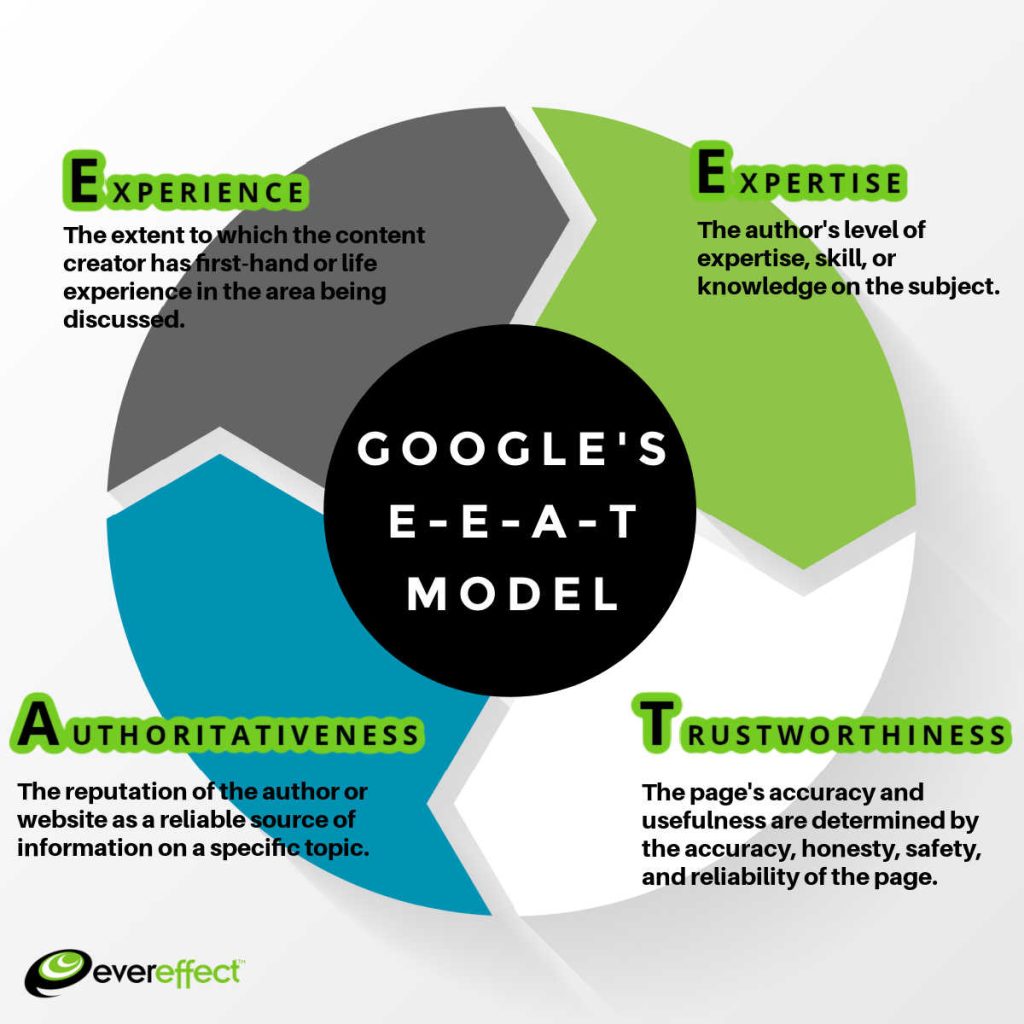
All marketers and business owners who need to rank higher in Google should follow the E-E-A-T principles. It’s especially crucial if your work is based on the YMYL (Your Money or Your Life) sector, like health, finances, safety, or happiness. Why? Because Google protects its users against scams that negatively influence their future lives, e.g., making incorrect and impulsive investment decisions.
Thanks to E-E-A-T rules, content creators can’t share professional-sounding nonsense and deceive users for financial gain. To clarify – they can, but their websites’ will be penalized by Google.
Let’s dive into E-E-A-T details!
Experience (E)
Experience is the first part of the E-E-A-T. You should write from your experience and opinions. Additionally, we recommend sharing examples or screenshots if you are reviewing a specific product.

E-E-A-T review from the author’s point of view. Source: www.androidpolice.com/samsung-galaxy-s23-review
Experience also applies “how-to” guides, e.g., in the crypto industry. When writing a step-by-step article, use helpful screenshots to describe the user’s registration process (content alone is insufficient).
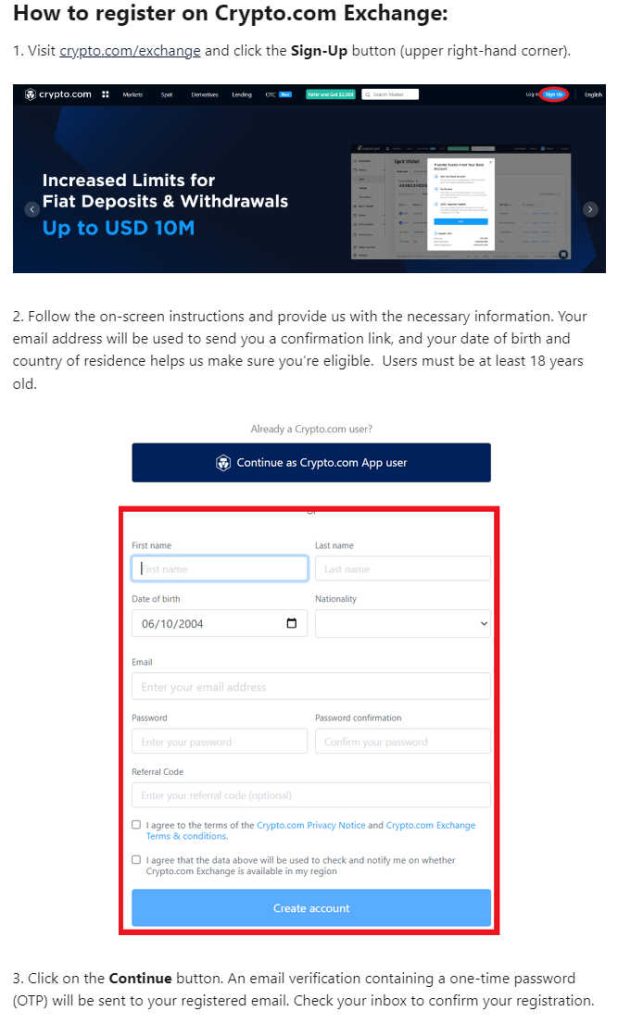
Informal guide with helpful screenshots. Source: help.crypto.com/en/articles/3495996-how-to-register-on-crypto-com-exchange
Expertise (E)
The second section of the E-E-A-T – Expertise. All YMYL topics should be written by reliable authors.
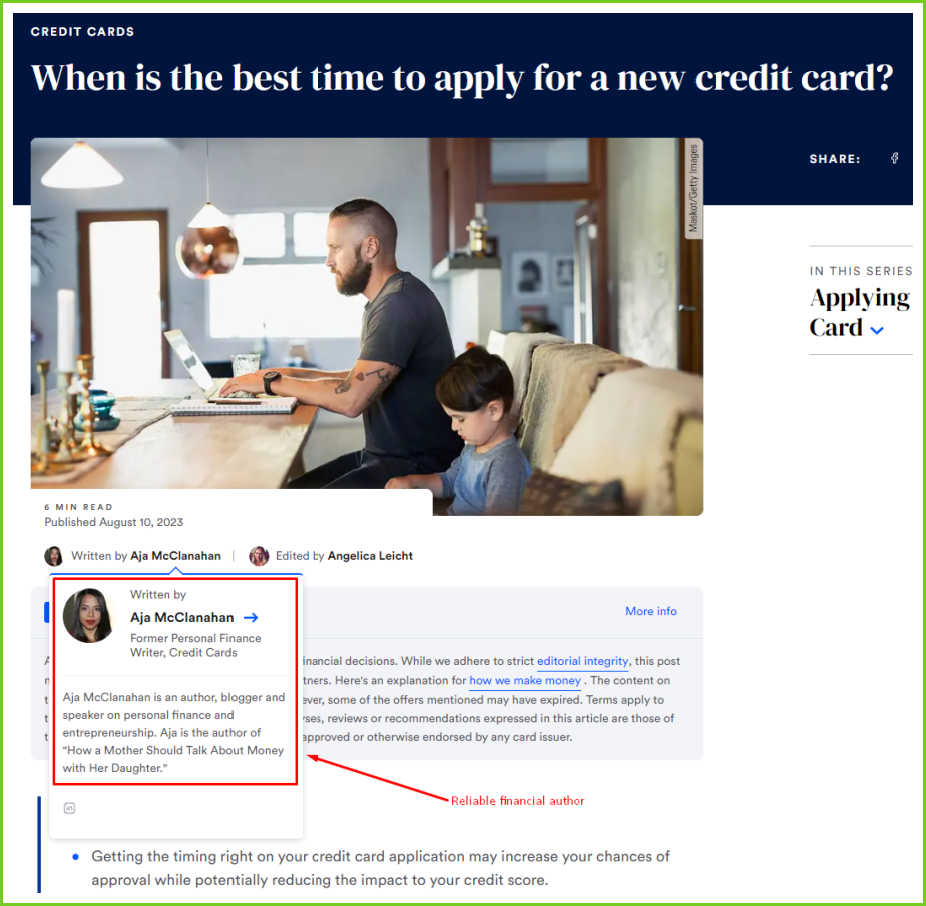
Reliable financial author. Source: www.bankrate.com/finance/credit-cards/best-time-to-apply-for-a-credit-card
Showing expertise is significant for users on the industry’s forums, like Quora. If you’re a certified expert with a few years of experience (or more), users will likely trust you.
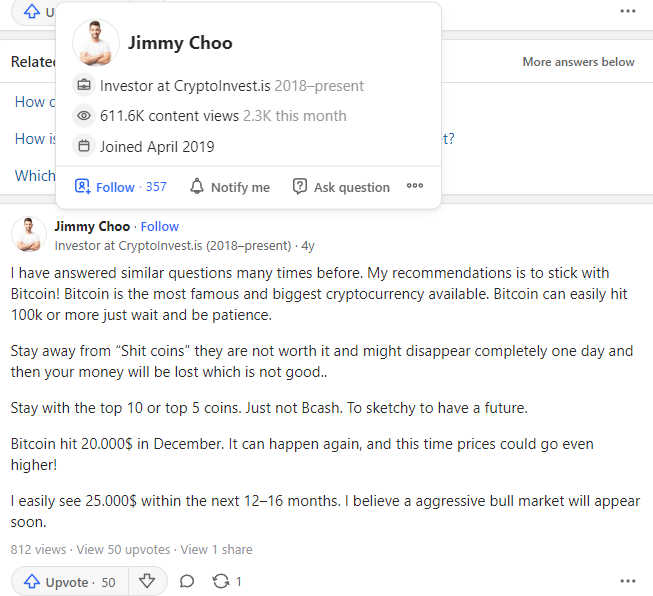
Jimmy’s answer to the question: “What is the best cryptocurrency to invest in right now?” Source: www.quora.com/What-is-the-best-cryptocurrency-to-invest-in-right-now
Authoritativeness (A)
The most challenging part of the E-E-A-T is Authoritativeness. To meet Google’s requirements in this area, you must have:
- A reputable website,
- Professional authors with years of experience,
- External experts who confirm the compliance of your article with actual industry standards.
Seems difficult? This is the only way to gain the trust of Google and users in YMYL industries, like finance.
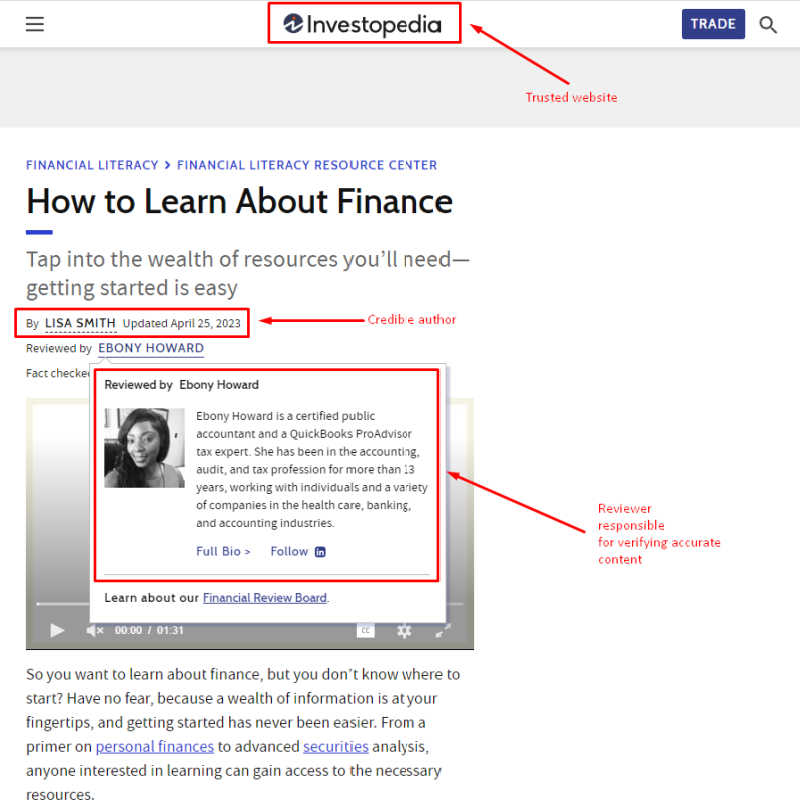
Proof of the website’s authority. Source: www.investopedia.com/articles/basics/11/become-self-taught-finance-expert.asp
You should also try and get backlinks from other authority websites. If others link to your content it provides another level of authority.
Trustworthiness (T)
You would think “trust” should be at the beginning, but it’s the last piece of E-E-A-T – Trustworthiness.
Search engine users are more aware than you think. To increase your e-commerce trustworthiness and conversion rate, you should implement an SSL certificate (one of over 200 ranking factors). This is a first step.
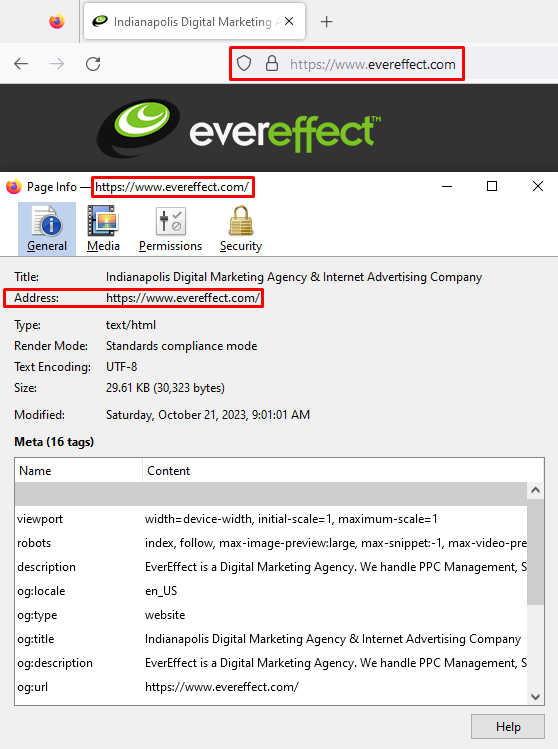
Correctly implemented HTTPS certificate. Source: www.evereffect.com
The second step is to guarantee secure and encrypted transactions.

Secure and encrypted transactions on Amazon. Source: www.amazon.com
Secure and encrypted transactions are essential for YMYL websites and e-commerce owners.
Is E-E-A-T an official ranking factor?
Google wants E-E-A-T content because this makes SERPs and the whole Internet more useful. Consider the official Google developers’ statement: E-E-A-T isn’t a ranking factor, but if you create content without following these principles, you won’t rank in search engines like Google, Yahoo!, Bing, DuckDuckGo, etc.
Directly from the horse’s mouth, check the Google Search Central guide fragment:
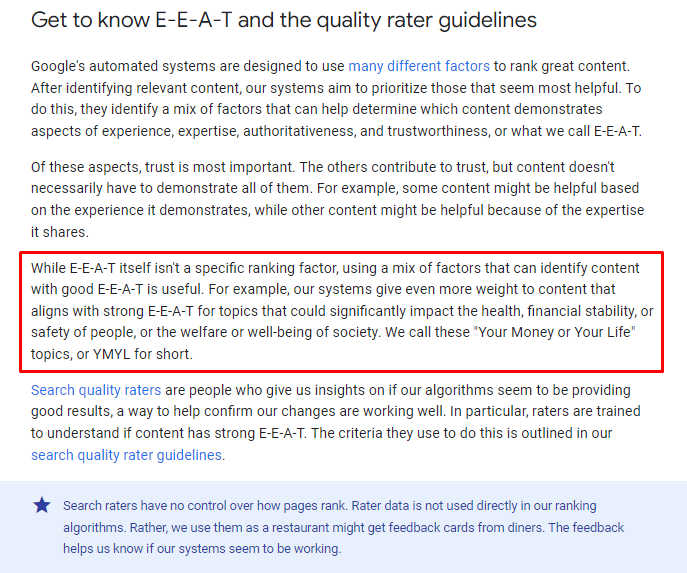
Google’s statement about EEAT. Source: developers.google.com/search/docs/fundamentals/creating-helpful-content
How to optimize the website for E-E-A-T principles? – 5 additional rules!
5 additional rules that help you optimize the website for E-E-A-T:
RULE 1: Bet on quality and substantive content
Quality, quality, and quality!
Regardless of your industry, you should create high-quality and substantive content without grammar and style errors.
Before you publish, check whether your content is:
- Helpful for your potential customers – Every piece of content may be a solution for specific problems;
- Unique – While duplicate content isn’t officially penalized by Google, it can cause ranking challenges as Google decides which duplicate pages to prioritize. This can also lead to issues with keyword cannibalization. To identify potential same content, we recommend using Copyscape;
- Errors-free – Any errors in your article negatively affect UX, maximizing bounce rate. Grammar and style mistakes influence your website’s SEO (Search Engine Optimization). To correct your content, try Grammarly or LanguageTool. If you want to work on text clarity, use Hemingway Editor.
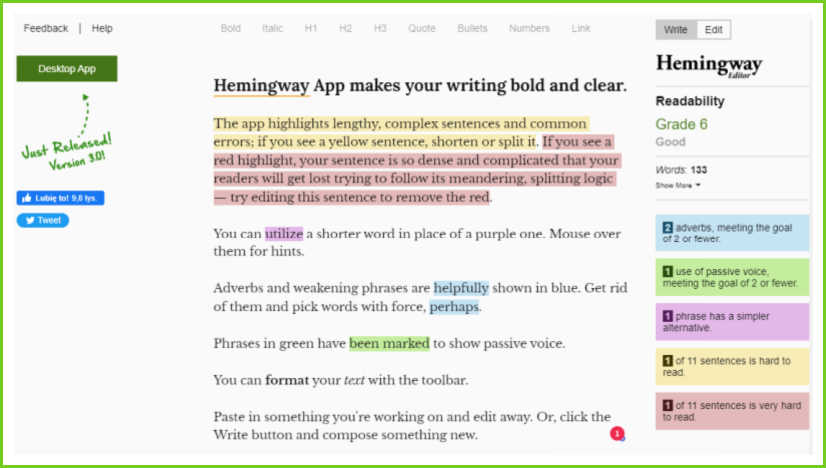
Hemingway Editor interface. Source: hemingwayapp.com
RULE 2: Refer to sources
If you can add sources – do it! Linking to the sources you used in your article will be more helpful and reliable for readers and journalists. It’s crucial, primarily when you use percentages or sentences requiring confirmation (e.g., about the safety of creatine or recommended dose, which Healthline did perfectly).
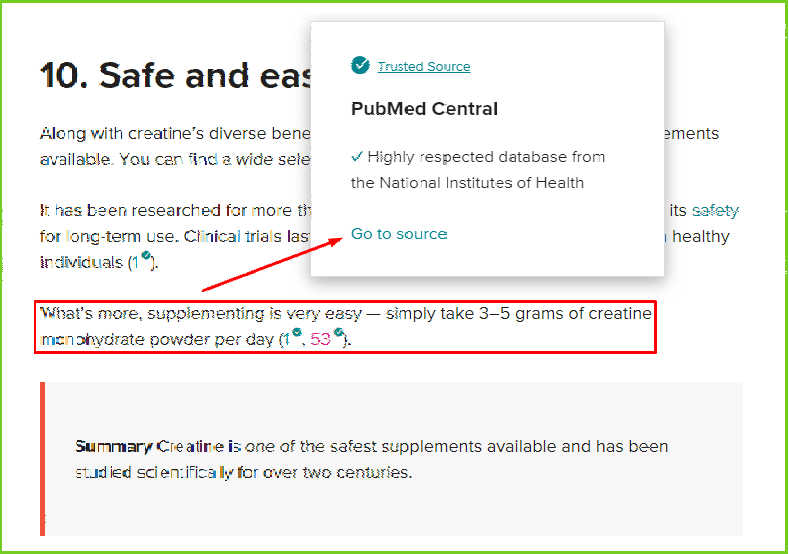
Data confirmation based on statistics PubMed Central. Source: www.healthline.com/nutrition/10-benefits-of-creatine
RULE 3: Tag each content creator on your blog
Tagging various creators on your blog allows you to build its credibility and authority.
You can do it like an Ahrefs:
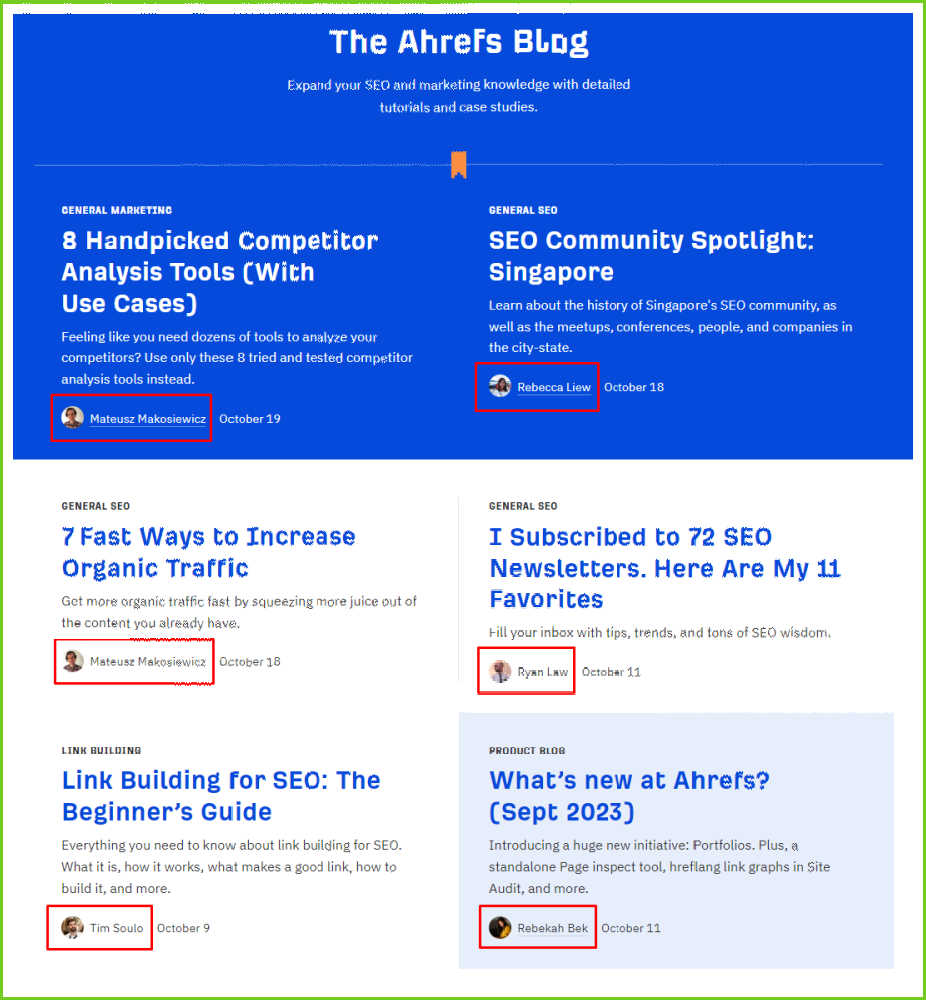
Various blogging creators. Source: www.ahrefs.com/blog
You can also publish entries as a company when you have only one author on your blog. It’s a suitable solution if you don’t work in YMYL. Otherwise, we recommend employing two or three freelance writers and one expert reviewer (e.g., a doctor).
RULE 4: Take care of UGC (User-Generated Content)
The more User-Generated Content you have, the more trust and authority your website enjoys. High-quality UGC affects Google’s ranking.
The first UGC example is about reviews on the Amazon product page.
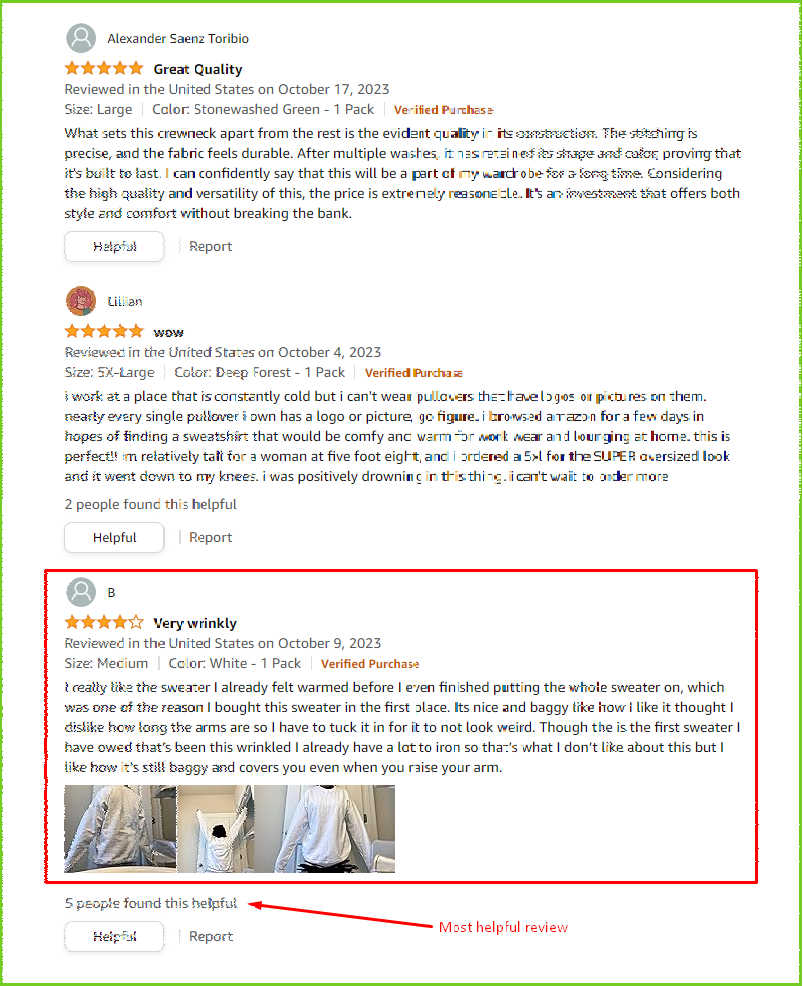
Most helpful review. Source: www.amazon.com
As you can see, five people reacted to the review with a photo because, apart from the author’s personal experiences, photos showing what the product looks like in real life have also been added.
The second UGC example refers to comments on a blog article in the form of a Surfer SEO review.
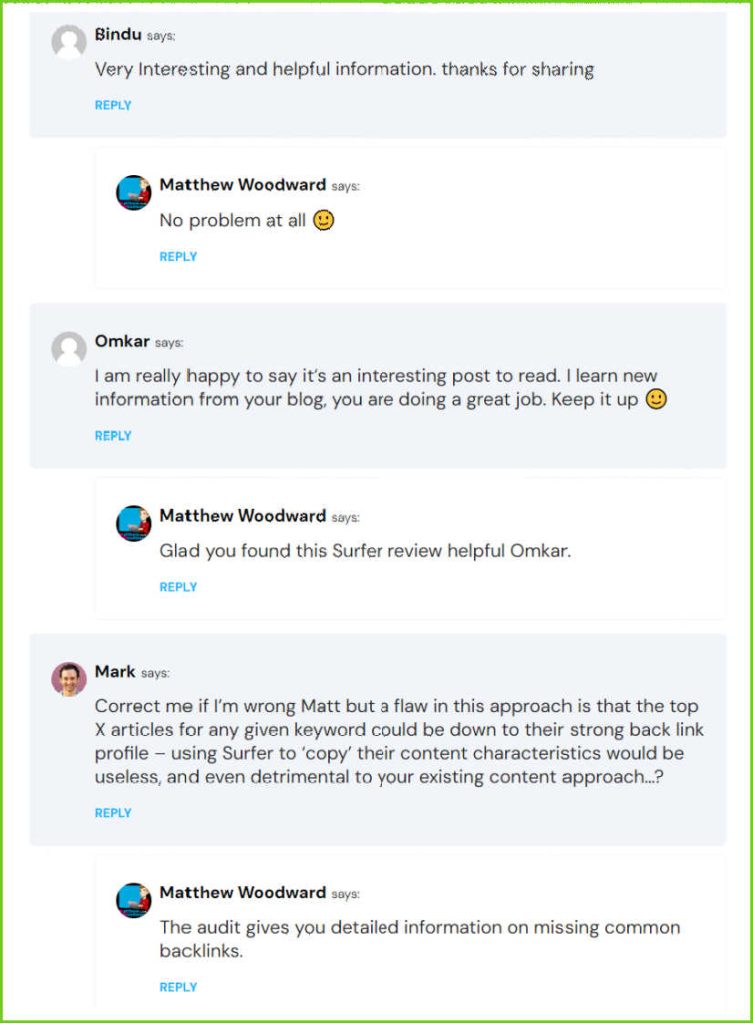
Blog comments and answers. Source: www.searchlogistics.com/learn/reviews/surfer-seo/
It’s challenging to rank in the TOP 10 on the “Surfer SEO review” keyword. To beat the competitors, authors bet on quality content, many do-follow links from authority sites, and… natural blog comments to skyrocket post authoritativeness.
“If you want to boost your blog post in SERPs, encourage users to leave a comment. This solution is reliable in every industry.” – Chris Bross, Partner at EverEffect.
RULE 5: Pay attention to backlinks and social signals
One of the dozens of ways to level up your site’s authoritativeness is getting backlinks and social media signals.
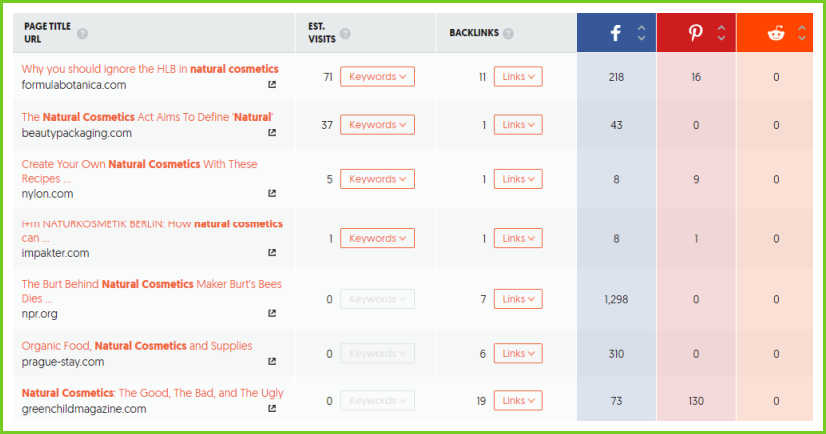
Social signals and backlinks to the given subpages. Source: app.neilpatel.com
You can also get backlinks for your homepage or given subpages, like a product or category page.
Don’t buy backlinks – you will be penalized by Google. The better way is to create viral content (e.g., with helpful industry statistics) or link exchange with a similar authority website as yours.
Remember!
Backlinks directly influence SEO. Social signals affect the overall score of your website from the crawlers’ point of view. Every action users take on your brand is essential. How they mention your website on the Internet impacts its position in the SERPs.
Final thoughts about E-E-A-T
Executing the E-E-A-T principles will help your site rank higher and fit into modern SXO (SEO + UX) standards. Look at the Search Quality Rater Guidelines to learn more about building trust and authoritative websites.
Remember that E-E-A-T rules were created to make the Internet a more valuable and straightforward place to search for any kind of information. Then, if you want to optimize your website for search engine standards, reach out to us today at 888-506-2183. Together, we’ll do more.
Google E-E-A-T – FAQ
What are the most common questions and answers about E-E-A-T?
1. What does E-E-A-T stand for?
E-E-A-T stands for Experience, Expertise, Authoritativeness, and Trustworthiness. It’s a set of criteria Google uses to determine the content quality, especially on websites dealing with the YMYL sector.
2. Why is E-E-A-T important for my website?
E-E-A-T is crucial because it helps search engines like Google, identify high-quality content that provides value to users. Adhering to E-E-A-T principles ensures your content is seen as credible, trustworthy, and authoritative, which can positively influence your rankings in search engine results.
3. How can I demonstrate Expertise in my content?
To show expertise, ensure your content is accurate, detailed, and written by knowledgeable authors. Crediting or relevant experience can bolster your content’s credibility when discussing specialized topics. Also, provide sources and references when necessary.
4. What strategies can boost my site’s Authoritativeness?
Build your site’s authority by producing consistent, high-quality content over time. Garnering backlinks from reputable sites and being cited as a reliable source can also enhance your website’s authoritativeness. Engaging with industry experts and thought leaders can further solidify your site’s standing.
5. How do I ensure Trustworthiness on my website?
Implement security measures, such as SSL certificates, to safeguard user data. Be transparent, provide accurate information, and avoid misleading or false claims. User reviews, testimonials, and a clear privacy policy can also enhance trust.
6. Is E-E-A-T a direct ranking factor in Google’s algorithm?
While E-E-A-T isn’t a direct ranking factor, its principles influence how Google perceives content quality. High-quality content that adheres to E-E-A-T guidelines is more likely to rank better in search engine results.
7. How often should I review and update my content for E-E-A-T?
It’s a good practice to periodically review and update your content, especially regarding YMYL topics. This ensures that the information remains current, accurate, and aligned with E-E-A-T principles. Regular audits can help you identify areas for improvement and maintain a high standard of content quality.

